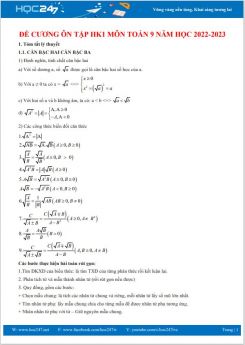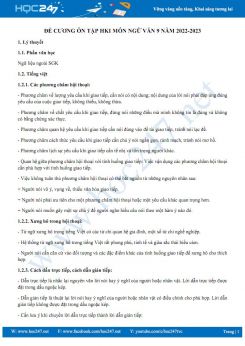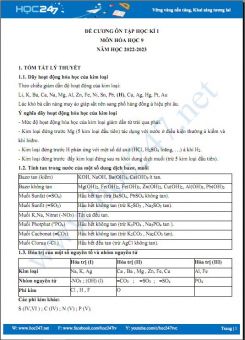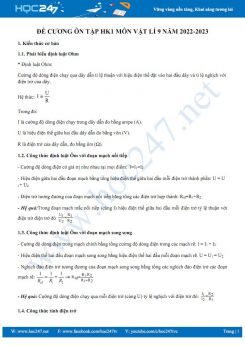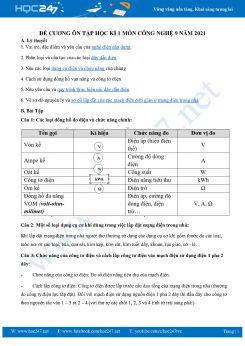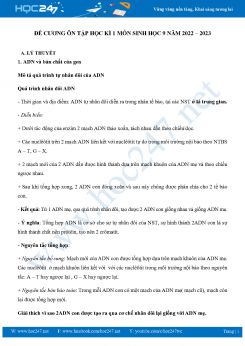Để chuẩn bị thật tốt cho kì thi Học kì 1 sắp tới, các em cần tổng hợp kiến thức trọng tâm và rèn luyện các dạng bài tập để ôn tập hiệu quả. Chính vì vậy, HOC247 đã biên soạn, tổng hợp nội dung tài liệu Đề cương ôn tập HK1 môn Tiếng Anh 9 năm học 2022-2023 dưới đây. Hi vọng đây là tài liệu hữu ích cho các em trong quá trình học tập và ôn thi. Chúc các em thi tốt!
1. Nội dung ôn tập
1.1. Tense Revision
1.2. Reported speech
- Cách đổi câu trực tiếp sang câu gián tiếp:
Thay đổi thì của động từ.
|
Trực tiếp (Direct speech) |
Gián tiếp (Reported speech) |
|
HTĐ (is/are/ am) |
QKĐ (was/were) |
|
HTTD (is/are/am + V- ing) |
QKTD(was/were + V- ing) |
|
TLĐ (Will) |
TL trong QK (Would) |
|
Can |
Could / be able to |
|
Shall |
Should |
|
Must |
Had to / would have to |
|
Have to |
Had to |
|
Will |
Would |
Thay đổi chủ ngữ, tân ngữ, đại từ sở hữu.
- Ngôi thứ nhất: (I, we, me, mine, us, our) được đổi sang ngôi thứ ba (He, She, It, They, him/her, his/ hers, its, their, them) phù hợp.
- Ngôi thứ hai (You, your, yours) được đổi theo ngôi của tân ngữ trong mệnh đề tường thuật.
- Ngôi thứ ba (He, She, It, They, him, his, her,them,their) giữ nguyên(không đổi).
Trạng từ chỉ thời gian.
|
Trực tiếp (Direct speech) |
Gián tiếp (Reported speech) |
|
now |
then |
|
ago |
before |
|
today |
that day |
|
tonight |
that day |
|
tomorrow |
the next day/ following day |
|
yesterday |
the day before |
|
last week/month/year |
the previous week/month/year |
|
next week/month/year |
the following week/month/year |
Trạng từ chỉ nơi chốn.
|
Trực tiếp (Direct speech) |
Gián tiếp (Reported speech) |
|
here |
there |
|
this |
that |
|
these |
those |
Câu mệnh lệnh gián tiếp
Công thức: TT:“V + O” => GT: S + told/ordered/asked + O + to-inf…
TT “Don’t/ doesn’t + V + O” => GT: S + asked/told + O + not + to-inf …
Câu nghi vấn
Yes/ No – questions
Công thức: TT: S + tell / told + “Do/does/was/will/are/is.. + S + V + O?”
GT => S + asked/wondered + (O) + If/ whether + S + V (lùi 1 bậc về QK) + O.
Wh – questions (who,what, where, why, when,how much/ many/ long”
Công thức: TT: S + tell/ told + “ wh- qs + (do/was/will)... + S + V + O?”
GT:S + asked/wondered + (O) + wh – qs + S + V(lùi 1 bậc về QK) + O.
Câu phát biểu
Công thức: GT: S + said (that) + S + V (lùi 1 bậc về QK)
1.3. Conditional Sentences (Câu điều kiện)
- Câu điều kiện 1: điều kiện có thể xảy ra.
Form:
|
MỆNH ĐỀ IF |
MỆNH ĐỀ CHÍNH |
|
Simple present (HTĐ) |
Simple future (TLĐ) |
|
If + S + V(HT) + O, |
S + Will/ Shall + V(inf) + O |
- Câu điều kiện 2: điều kiện không có thật ở hiện tại.
Form:
|
MỆNH ĐỀ IF |
MỆNH ĐỀ CHÍNH |
|
Past simple (QKĐ), |
would/could/ should/ might + Vinf |
|
If + S + V–ed (V2) + O, |
S + would/ could + V(inf) + O |
Note: Unless = if...not (nếu không, trừ khi)
1.4. The passive voice
Bảng tóm tắt công thức các thì trong câu bị động.
|
Hiện tại đơn |
Am, is, are + V- ed (pp) |
|
Quá khứ đơn |
Was, were + V- ed (pp) |
|
Hiện tại tiếp diễn |
Am,is, are + being + V- ed (pp) |
|
Quá khứ tiếp diễn |
Was, were + being + V- ed (pp) |
|
Hiện tại hoàn thành |
Have, has + been + V- ed (pp) |
|
Động từ khiếm khuyết |
Can,may,might,should,will Have to, used to, + be + V- ed (pp) |
Cách đổi:
Bước 1: Lấy Tân ngữ (O) câu chủ động xuống làm Chủ từ (S)câu bị động.
Bước 2: a/ Lưu ý Động từ câu chủ động ở thì nào To Be ở ngay thì đó.
b/ Động từ chính đổi sang dạng PP (QK phân từ)
Bước 3: Lấy Chủ từ (S)câu chủ động xuống làm Tân ngữ (O)câu bị động đặt sau By chỉ tác nhân.
Eg: I learn English everyday.(Active)
=> English is learnt by me everyday. (Passive)
1.5. Verbs Form
I. To – infinitive.
Sử dụng trong các trường hợp sau:
- Sau các động từ: want, intend, decide, expect, hope, mean, offer, promise, refuse, wish,....
- Sau các tính từ: glad, happy, ready, kind,....
- Sau các phó từ: enough, too,
- Trong cấu trúc: - It + take + O + (time) + to-inf
- S + V + O + (not) + to-inf (V: ask, get, tell, want, advise, request,...)
II. Bare infinitive.
Sử dụng trong các trường hợp sau:
- sau Model Verbs như: can, may, must, will, shall, would, should, would rather, had better,....
- trong cấu trúc với V là: make, let, have
- trong cấu trúc với V là động từ tri giác: see, hear, notice, feel,.
III. Verb- ing.
Sử dụng trong các trường hợp sau:
- Sau một số động từ như: avoid, dislike, enjoy, finish,keep, mind, practise, stop....
- Sau các Phrasal verbs: to be used to, to get accustomed, to look forward to, to have a good time/difficulty, to be busy, to be worth,...
- Trong cấu trúc với V là động từ tri giác biểu đạt hành động đang tiếp diễn
- Trong cấu trúc: would you mind …
- Sau các giới từ như: about, of, with, without,...
1.6. Structure with "WISH"
Động từ Wish = If only (ao ước) thường dùng để diễn tả những ước muốn, những điều không có thật hoặc rất khó thực hiện.
Có 2 loại câu ước.
- Future wish: (ước muốn ở tương lai)
* form: S1 + wish + S2 + would/ could + V(inf) + O.
If only + S + would/ could + V(inf) + O
* eg: I wish I would be an astronaut in the future.
Tom wishes he could visit Paris next summer.
If only I would take the trip with you next Sunday.
- Present wish (ước muốn ở hiện tại)
* form: S1 + wish + S2 + V- ed + O
Were + adj / n * Note: Tobe dùng Were cho tất cả các ngôi
* eg: I wish I were rich (but I am poor now)
I can't swim. I wish I could swim.
2. Bài tập ôn tập
Exercise 1: Choose the best answer about Reported Speech
Question 1. Lan asked her teacher what requirements she ______ as a monitor.
A. needs to do B. needed doing
C. need to do D. needed to do
Question 2. I asked Martha ________ to enter law school.
A. was she planning B. is she planning
C. if she was planning D. are you planning
Question 3. I wondered ________ the right thing.
A. whether I was doing B. if I am doing
C. was I doing D. am I doing
Question 4. He wants to know whether I _______ back home.
A. come B. came C. will come D. would come
Question 5. They said that they had been driving through the desert ________.
A. the previous day B. yesterday C. the last day D. Sunday previously
Question 6. Peter asked Jane why_____ the film on T.V the previous night.
A. didn't she watch B. hadn't she watched
C. she doesn't watch D. she hadn't watched
Question 7. He advised them _______ in class.
A. to not talk B. not to talk C. to talk not D. don't talk
Question 8. Julia said that she _________ there at noon.
A. is going to be B. was going to be C. will be D. can be
Question 9. He _______ that he was leaving that afternoon.
A. told me B. told to me C. said me D. says to me
Question 10. He proved that the earth _______ round the Sun.
A. had gone B. was going C. goes D. would go
Question 11. I wonder why he ________ love his family.
A. doesn’t B. don’t C. didn’t D. hasn’t
Question 12. He asked the children ______ too much noise.
A. not to make B. not making C. don't make D. if they don't make
Question 13. Mr. Hawk told me that he would give me his answer the ____ day
A. previous B. following C. before D. last
Question 14. The woman asked ________ get lunch at school.
A. can the children B. whether the children could
C. if the children can D. could the children
Question 15. The teacher asked me __________ worried about before the exam.
A. What I am most B. what I am
C. what most I was D. what I was most
Exercise 2: Choose the best answer about “Wish”
Question 1. Lan wishes there________ a smart board in her classroom.
A. was B. were C. is D. had been
Question 2. We all______ it were the weekend tomorrow.
A. think B. hope C. wish D. want
Question 3. Minh wishes he _______ English perfectly well.
A. spoke B. speaks C. is speaking D. has spoken
Question 4. “He has to work 12 hours every day.” “_______”
A. sure
B. How cool!
C. I wish I could go back home
D. I can’t imagine that
Question 5. I wish I ________ near my shcool.
A. lived B. live C. will live D. am living
Question 6. She wishes she ______ a longer summer vacation.
A. can have B. could have C. is having D. has
Question 7. They are building a new airport in my area. I wish they______.
A. were B. will not be C. weren’t D. aren’t
Question 8. “How cool!” is used to express ________
A. an agreement B. a wish
C. a surprise D. an appreciation
Question 9. I wish this LCD projector ______ still expensive.
A. will not be B. was not C. were D. is not
Choose the underlined word/ phrase which is INCORRECT.
Question 10. They wished that time will be turned back so that they could go kite-flying with other kids.
A. wished B. will be turned C. could go D. kite-flying
Question 11. I have a lot of work to do. I wish I have more time.
A. have B. a lot C.to D. have
Question 12. I wish I could make a 20000 miles-undersea trip in a nuclear submarine.
A. could B. 20000 miles C. in D. nuclear
Question 13. I wish the school authorities can set holidays based on local weather conditions.
A. authorities B. can C. based on D. conditions
Question 14. I wish graduates from college have enough skills to meet the requirements of their jobs.
A. graduates B. have C. to meet D. requirements
Question 15. I wish many schools in Vietnam were not overcrowded so that there are many students.
A. were B. not C. so that D. are
Exercise 3: Put the verbs in the brackets in the corect tenses:
1. He never.....(listen) to what you say. He always .........(think) about something else.
2. We ...................(not meet) each other since we .......................(leave) school.
3. She..................... (not study)on Friday.
4. I usually ....................(have) breakfast at 7.00.
5. We (fly).................... to Spain every summer.
6. My mother .............. (fry)eggs for breakfast every morning.
7. The bank ................(close)at four o'clock.
8. Yesterday, I ...............(go) to the restaurant with a client.
9. When we.................. (arrive) at the restaurant, the place............... (be)full.
10. I ...............(not go) to school last Sunday.
11. ............she ..........(get) married last year?
12. After she .........................(finish) her homework, she ................(go) out with her friends.
13. Yesterday, she.....................(burn) her hand while she .......................(cook) dinner.
14. Look ! Peter ........................(play) a piece of his favourite music.
Exercise 4: Change these sentences into passive voice:
1. My father waters this flowers every morning. .....................................
2. John invited Fiona to his birthday party last night. ..........................................
3. Her mother is preparing the dinner in the kitchen.............................
4. We should clean our teeth twice a day. .......................................
5. Our teacher have explained the English grammar. ...............................
6. Tom will visit his parents next month. ...............................
7. Her mother used to give her some sweets after the meals. ................................
8. They are going to build a new supermarket near my house. ..............................
9. We need to protect our environment. ............................................
10. Do your paretns make you study hard ? ........................................
Exercise 5: Read the passage, and choose the correct answer A, B, C or D for each question.
|
Do you ever think about what schools will be like in the future? Many people think that students will study most regular classes such as maths, science and history online. Students will probably be able to these subjects anywhere using a computer. What will happen if students have problem with a subject? They might connect with a teacher through live videoconferencing. Expert teachers from learning centres will give students help wherever they live. Students will still take classes in a school, too. Schools will become places for learning social skills. Teachers will guide students in learning how to work together in getting along with each other. They will help students with group projects both in and out of the classroom. Volunteer work and working at local businesses will teach students important life skills about the world they live in. This will help students become an important part of their communities. Some experts say it will take five years for changes to begin in schools. Some say it will take longer. Most people agree, though, that computers will change education the way TVs and telephones changed life for people all over the world years before. |
1. What is the main idea of the passage?
A. All classes will be taught online in the future.
B. Teachers will help students from home in the future.
C. Kids won’t have to go to school in the future.
D. Computers will change education in the future.
2. What will happen if students meet difficulties with a subject?
A. They will telephone the teachers who are staying at the school to seek their help.
B. Schools will organise a live videoconference for teachers to help students with problems.
C. Teachers from learning centres will give them help through live videoconferencing.
D. They will meet their teachers in person for help with problems with the subject.
3. The main role of teachers in the future will be _____________.
A. helping students with group projects
B. organising live videoconferences
C. providing students with knowledge
D. guiding students to learn computers
4. Students will still go to school to _____________.
A. play with their friends
B. learn all subjects
C. learn social skills
D. use computers
5. Students will learn important life skills through _____________.
A. working in international businesses
B. doing volunteer work
C. going to school every day
D. taking online classes
3. Đáp án
Exercise 1: Choose the best answer about Reported Speech
|
Question 1. D |
Question 6. D |
Question 11. A |
|
Question 2. C |
Question 7. B |
Question 12. A |
|
Question 3. A |
Question 8. B |
Question 13. B |
|
Question 4. C |
Question 9. A |
Question 14. B |
|
Question 5. A |
Question 10. C |
Question 15. C |
Exercise 2: Choose the best answer about “Wish”
|
Question 1. B |
Question 6. B |
Question 11. D |
|
Question 2. C |
Question 7. C |
Question 12. B |
|
Question 3. A |
Question 8. D |
Question 13. B |
|
Question 4. D |
Question 9. B |
Question 14. B |
|
Question 5. A |
Question 10. D |
Question 15. C |
Exercise 3: Put the verbs in the brackets in the corect tenses:
1. He never.. listens...(listen) to what you say. He always .....thinks....(think) about something else.
2. We ..........haven’t met.........(not meet) each other since we ............left...........(leave) school.
3. She............doesn’t study......... (not study)on Friday.
4. I usually ........have............(have) breakfast at 7.00.
5. We (fly).........fly........... to Spain every summer.
6. My mother ......fries........ (fry) eggs for breakfast every morning.
7. The bank .........closes.......(close)at four o'clock.
8. Yesterday, I .....went..........(go) to the restaurant with a client.
9. When we........arrived.......... (arrive) at the restaurant, the place....was.......... (be) full.
10. I .......didn’t go........(not go) to school last Sunday.
11. ......Did......she ...get.......(get) married last year?
12. After she ...........had finished..............(finish) her homework, she ......went..........(go) out with her friends.
13. Yesterday, she..........burnt...........(burn) her hand while she ..........was cooking.............(cook) dinner.
14. Look ! Peter ........is playing................(play) a piece of his favourite music.
Exercise 4: Change these sentences into passive voice:
1 - This flowers are waterred every morning.
2 - Fiona was invited to his birthday last night
3 - The dinner is being prepared in the kitchen.
4 - Our teeth was cleant twice a day.
5 - The English grammar has been explained.
6 - His parents will be visited next month.
7 - She was used to given some sweets after meals.
8 - A new supermarket is gong be built near my house.
9 - Our environment need to be protected.
10 - Are you made study hard?
Exercise 5: Read the passage, and choose the correct answer A, B, C or D for each question.
|
1. D |
2. C |
3. A |
4. C |
5. B |
...
Trên đây là toàn bộ nội dung tài liệu Đề cương ôn tập HK1 môn Tiếng Anh 9 năm 2022-2023. Để xem thêm nhiều tài liệu tham khảo hữu ích khác các em chọn chức năng xem online hoặc đăng nhập vào trang hoc247.net để tải tài liệu về máy tính.
Mời các em tham khảo tài liệu có liên quan:
Hy vọng tài liệu này sẽ giúp các em học sinh ôn tập tốt và đạt thành tích cao trong học tập.







